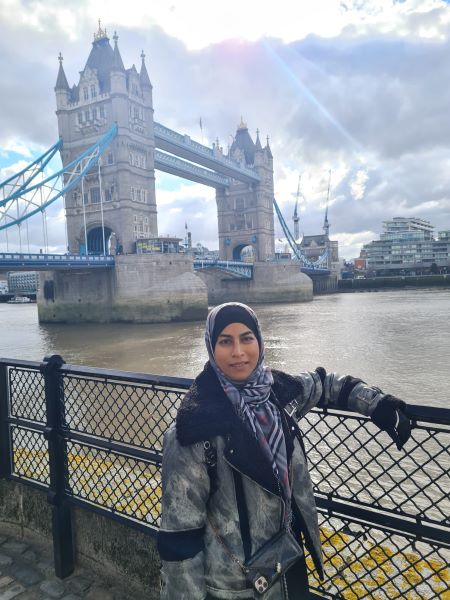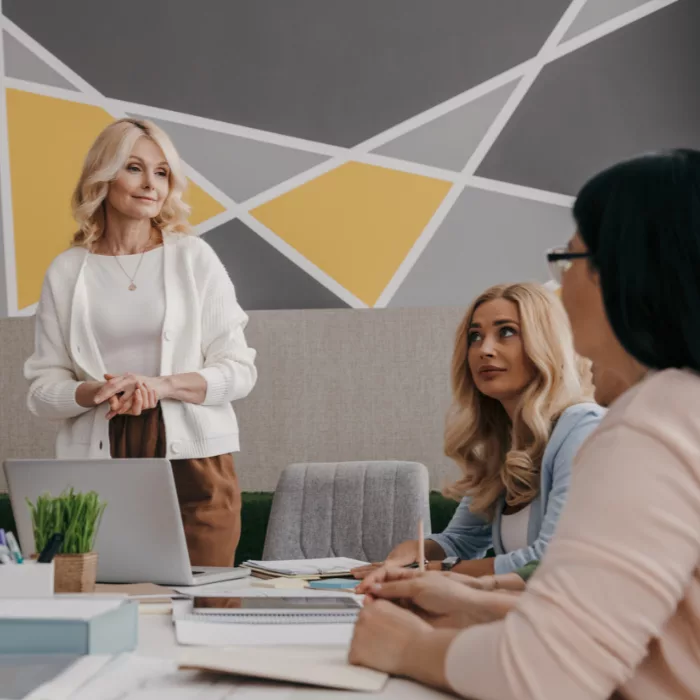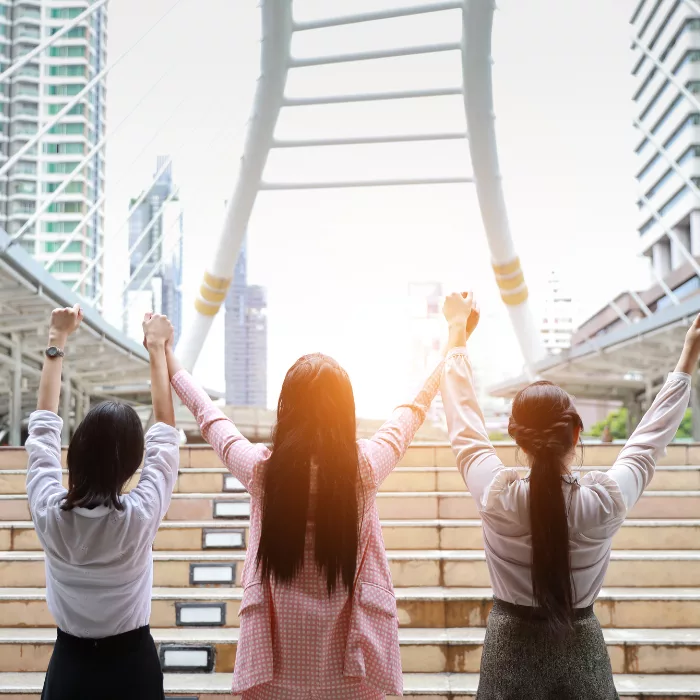
Unlocking Potential Through Effective Communication
Meet Jan Daudi, Journalist and Certified English Teacher and Safe Space Strategist. With over 20 years of experience, she empowers individuals from diverse backgrounds, from C-suite leaders to refugee children, to find their voice and make an impact. In this exclusive interview, Jan shares insights into her mission of fostering self-advocacy, building safe spaces, and empowering women to thrive personally and professionally, all through the lens of effective communication. Join us as we delve into her transformative approach and the challenges and opportunities she encounters as a British expat living in the UAE with her five children.
Can you share with us how your diverse background in journalism, psychology, and education has shaped your approach to teaching English skills to a wide range of individuals, from C-suite leaders to refugee children?
Well, I think in the communication space, it’s very easy to get stuck into the zone of teaching public speaking or how to. have impressive elocution, or perhaps even leadership and negotiation skills. The compartmentalization of communication has its uses, if somebody wants to specialize in something, but I am looking to give a broad skill set to women in terms of success on all metrics in life, personal and professional. My central theme is, say what you mean. mean what you say without being mean. And that will cover your marriage, relationships, children, and also how you carry yourself in the leadership capacity professionally. All communication starts with psychology. Developmentally as children, you learn how to speak, you learn. When not to speak you have your confidence built in early years and often even Those things carry into and have a huge impact in our adult life many times we might even need therapy or training to get us to the place where we want to be after we’ve been in a bad space as young people. So, as a teacher, I teach skills and the ABCDs of things literally when I was teaching migrant women and that was an amazing empowerment work that I did because those women were intelligent but they used to rely on their kids for assistance when they entered the UK. And they got their life back by having basic English skills. And C-suite leaders. Women come to me successful, established, but unhappy. They have microaggressions, they’ve got problems with being pushed out of the boardroom, and perhaps even issues with harassment and major concerns about their safe spaces. So their success is not only dependent on having a great wage. or having a title, they’ve got to feel safe to thrive and not just survive. So those three things are relevant.
What inspired you to bridge the gap between journalism, psychology, and education, ultimately leading you to become a certified English teacher with a focus on “Communicating for Impact and Influence”?
I became certified by Cambridge University in “Communicating for Impact and Influence” during COVID while I was also doing my master’s degree in journalism. At that time I did not expect to have my five kids at home with me in lockdown! It was easy to give up.
On my dreams of expanding my communications expertise but I believe that each one of us has an impact and influence capacity within us. It’s a shame that people often take the great potential and great experiences to the grave with them. My wish is to share my talent to empower women who may not be represented, who may not feel that they have a place for their story, but even with my journalism as well, to give a platform and a place for those stories and for women to find their voice. So. That is actually where my journalism intersects with psychology and education. My personally designed trainings give women the ability to emerge into their full empowerment.
Hosting a live current affairs women’s talk show in London must have been an exciting and enriching experience. How has this experience influenced your perspective on communication and advocacy, especially in the context of empowering women?
Well, I’m a certified actress as well. I did seven years of training as, a teenager, and became certified at the London School of Drama. I realized that that my live TV experience threw me straight into the deep end and also pushed me to overcome the kind of ideas of what people think a women of my of my demographic should be doing in media. With millions of people watching me the only way you can perform is to concentrate on your purpose and you focus on your mission message. And also if you have a host or a guest that you’re interviewing, it’s all about being less selfish and carrying a story and doing justice to a story. It was a good foundation for my future in journalism when you allow your guests to shine. I think the power of media for positive impact, really is one of the key learnings and takeaways. I got offered the position of being the Islam Channel spokesperson as a result of doing that work. I declined the offer as I had some other ambitions in my, my portfolio of things that I wanted to do, but to have that recognition was amazing. And I think. It’s always good to step out of your comfort zone.
As a member of the Dubai alumni of CISL and having trained with award-winning TV producers in media presenting, what key insights have you gained that inform your teaching methods and communication strategies?
The key insight is to be yourself. At present, people do not want a copy-paste of Trevor McDonald or Kate Adie or whatever presenter comes to mind. Um, you are going to attract the audience that you need for the work that you do. And that’s only going to come about by you being yourself. And I think representation, diversity, and inclusion cannot happen. Unless you are being yourself. Because that’s the whole point of diversity. To see different types of contributions in the media platform is what makes it exciting and provides real value.
With over 20 years of experience teaching English skills to diverse audiences, what are some of the most valuable lessons you’ve learned about effective communication, particularly in today’s globalized world?
I’d say the most effective lesson, a valuable lesson, is the power that each individual has to change the world. I think people underestimate their little idea, as they might put it, my clients often use this term, I have a, I have an idea or a little dream, and they kind of belittle it and they always talk themselves out of it before. They expressed it to the world, but you have to realize every single great idea Started as a little idea with somebody sitting alone in a room somewhere And then an immersion in global movement as we’ve seen with so many things in life I think it’s vital that people do not quiet their internal voice due to self-limiting beliefs That’s where my psychology comes into it mind hacking people out of not speaking, not presenting. And I think as well, English language teaching, especially with the Syrian children coming out of war zones and women who have had immense trauma and struggles. It’s so empowering, so empowering to own your voice. So many times in the media with Syrian. Refugees, for example, and the whole concept of refugees, the negative labeling, the idea that they are less, the, well, often horrific struggles they face with racism and abuse and violence in the, in the countries that they, they are hosted in. It isn’t always positive, even though they’ve managed to escape. Um, terrible circumstances, sometimes where they end up is often very challenging. So to own your narrative and be able to have the power to present your own story is very, very important. That’s one of the key takeaways in my English language work that I’ve done with diverse audiences.
Your vision to revolutionize the safe space narrative by emphasizing “self-advocacy” and stakeholder partnerships is intriguing. Could you elaborate on how you plan to implement this vision in your communication skills frameworks?
Yes, I can. What I’ve understood from validating my executive training is women have come to me time and time again with the same patterns well, I will say it like this. I’m successful. I’ve got lots of things that I have to be grateful for, but I’m also deeply unhappy. When I analyze why they’re unhappy with their high level of achievement, it’s often to do with the fact that they don’t feel that their voice is seen. And they’re coping with survival mode strategies instead of being able to thrive. And that’s a great shame. It’s a shame that women with huge talent don’t have that talent emerging in its full force because they cannot self-advocate for their safe space. And self-advocacy is about understanding that many times the policy is there for gender inclusion, equity or diversity metrics because by law many institutions have to have those things there but women’s issues are very unique and many times loopholes and things are happening where those policies do not serve them and are designed to be specifically relevant to the people that need these solutions. As a result many individuals get left out of having someone advocate for them through policy and many times women have expressed to people, their peers or their management, “I’m not happy with this, I don’t like that way I’ve been treated or I feel uncomfortable or underrepresented”. To add to the crisis they will often feel isolated as piers witnesses the problem and don’t do anything to help. So policy fails them, and people fail them. And that is the copy-paste of what’s happened to me over clients struggling in facing harassment or abuse of power in management. I have found that in expression of myself as a spiritual person and it’s the needs of my demographic are not always catered for. People who knew of my violations did not intervene in any of the public abuse dynamics. For example one of the many psychological pressures one female manager enforced, was timing me going to the bathroom and she recruited by everyone in the office to to do that and other harassment tactics. I mean, there’s no policy against the things she did but the impact is still great. You can’t take that “perception of threat” to court. It’s very, very clear from my clients that many, many people are suffering in silence. They go on for years and years and sometimes even have mental breakdowns or end up in therapy. One of the women I’ve trained lost her voice completely. She has a terrible stutter and I had to train her out of that because of the years of toxic management that she suffered under. Those are the areas that I think are relevant for self-advocacy. It’s a definite need.
Being featured as a global expert on influential female membership platforms and recognized as one of the top 100 women making an impact in Africa is truly remarkable. How do these accolades inspire and motivate you in your mission to empower individuals through communication?
Well, I think accolades are great. Accolades are wonderful too. Not stroke one’s ego. I think it’s more important. that these things are understood to accelerate my reach for the work that I do. Accolades come and go, um, you know, those awards will be gathering dust on some shelf somewhere, but what is important is that many people know about the need for revolution in the safe space agenda. Know about skills and techniques to avoid harassment and abuse so that you don’t have to wait for years to suffer, but you can catch it before it becomes a horrible situation. So I want these awards to serve me to get reach and access to the people who need to hear. About what I do. So that’s how I look at awards and accolades, and that’s why I might Engage in these things because it just simply accelerates my work.
As a bestselling author and the founder/CEO of “MissCommuniTeam,” could you share some insights into the philosophy and methodology behind your communications training company, particularly in fostering female empowerment?
Particularly in fostering female empowerment. I think the best way to do that is via my business Mottoes and my business mantra. My mantra is to say what you mean Mean what you say without being mean and the three things that encompass that is to say what you mean through being accurate. So many people nowadays lead with bias, assumption, fake news as we know is a huge problem, and the lack of critical thinking. So following other people’s agendas, and ideas, not doing the right thing because everyone else is not doing the right thing, and being accurate and not lazy in how you formulate your communication is a huge, huge issue in a safe space when people are facing stereotypes and examples of harassment and abuse are often coming from places of assumption and bias. And also in terms of being able to be holding yourself and carrying yourself with integrity, accuracy is important. Then in terms of meaning what you say, don’t fake it till you make it. I don’t agree with that philosophy. People need to trust you. People need to have authenticity. So after accuracy, it’s authenticity. And that’s what is our superpower. Nobody else can be Us and if we realize that we don’t have to follow a personality type We don’t all have to be Kim Kardashian We don’t all have to be somebody who’s got a million followers on Instagram or whatever You will understand and free yourself to explore who you are and that’s true empowerment. So authenticity And then without being mean hyper-masculinization of women And the idea that you need to act like a man to be taken seriously to be aggressive to have power. Those things I’ve experienced myself in leadership and in the workspaces that I’ve been in, and that’s a horrible, toxic trait. The United Nations, when I did my course with Cambridge University, one of my trainers was from the CISL. She was a United Nations peace negotiator. She said the United Nations actively recruits women because they have a higher rate of being able to dismantle highly dangerous situations. And that’s because feminine energy has a unique power of making people feel safe. And that’s a thing that I like to quote a lot because a lot of women don’t realize they don’t need to make their feminine traits disappear. People need that maternal energy and it’s a great thing to have if you know how to use it properly. You can be assertive and you can be kind. You don’t have to belittle someone to make your point and raise yourself. So say what you mean, mean what you say without being mean. I think on a final note there, my actual logo says your word is your world, and I truly believe that you can build the world you want with the language you have if you have the right training and skills. Living as a British expat with your five children must present its own set of unique challenges and opportunities.
Living as a British expat in the UAE with your five children must present its own set of unique challenges and opportunities. How has this multicultural environment influenced your approach to teaching and mentoring others in communication skills?
I am very interested in working more with the MENA region women, the women of the Middle East and Africa, and North Africa. Um, for me, let’s look at myself. Um, I was a person who was born and raised in the UK. I happened to have done a deep dive into my identity and accepted an Islamic way of life, consciously choosing to be a visible Muslim woman whilst I was being educated in a Catholic convent. And I have to say, that intersection between Western culture and Eastern culture had its huge dilemmas for me. Presenting myself to my family and other people who were, well, not very happy, to be honest. I lost a lot of people, I had huge fights with my family, um, and there was a sense that you’re becoming one of those negative archetypes that were represented after 9/11 and in the Gulf War, and there are no positive representations of my demographic, really, in any large space of people, it’s always negative. So, unfortunately, those things are very real challenges that visible Muslim women have to face. Physical attacks in the street, um, being demonized and having the explanation of, you know, yes, I can speak English and the assumption that you can’t, your father or your husband made you wear that. It’s, it’s, uh, unfortunate. But it’s really interesting as well that because I’ve lived and immersed myself in a regular One could argue, uh, Western culture. I can see the struggles that Muslim women might have when they are navigating that space. When I go to conferences, marketing, business conferences, global events, I’m often, very often, uh, out, uh, well, outside of the Gulf area. I’m often the only one of my demographic there. So clearly women of my demographic do feel They don’t belong in those spaces. They don’t feel the need they express themselves in business or other areas to the same extent. And I think that’s a shame because they have a lot to offer. Um, it’s more relevant to have women’s platforms in the UAE and the Middle East that are unique to women of this demographic. So to have reach, to have access, there’s got to be a way to bridge that divide and unless. Well, I’m hoping to do this now. Unless there’s good facilitation of trust, engagement, and understanding, that sort of space where you only see a demographic in one area, and you only see certain types of personalities in certain meetings, um, that space will not be bridged. And I hope to do that work by empowering Muslim women with skills, or Middle Eastern women, or indeed women of my region with skills so that they can feel confident to show up in their Cultural comfort zones. I think that might be a term. Cultural comfort zones. So that they can still express their skills without feeling the need to hide who they truly are.
Finally, as an Official Mentor on the award-winning women’s career app “PLAYBOOK,” what advice do you often find yourself giving to aspiring communicators and leaders, especially those navigating diverse cultural and professional landscapes?
I would say, don’t. underestimate the power of mentoring. Um, you must recognize and acknowledge your achievements. Whether it’s award-winning or C-suite level or in terms of multiple degrees, I mean, I have multiple degrees. But there’s always a next level and I think growth has to be from a space of self-awareness. When you get settled into doing things the same way all the time, that’s always a danger sign. So I offer a communications assessment for women and it’s the only thing of its kind in the world. I’ve designed it as a psychologist and as a trained communicator and The women have had an outstanding life-transforming experience just by sitting in a safe space with another woman and having them listen to them and I would give feedback on their strong points and areas of growth and I’d get comments after those communications assessments for women saying that maybe my husband doesn’t understand me the way you did, and the ability to connect on a level that is noncompetitive, purely collaborative, and in a very self-affirming way. Those women have come to tears many times in my sessions with just one conversation, and I think I always say, Get mentoring, get someone who you can feel comfortable with to unlock the next levels of your development because there’s always a next level. Those are the answers to the questions I believe. I shall, um, put that on a drive with a link and hopefully, that will be, um, helpful for you to, um, produce the relevant article.

APPLY TODAY
100 Top Global Women Entrepreneurs – Global Woman Magazine
Our Journey in 12 Months:
Our Journey in 12 Months – Global Woman Magazine
5 Things That Show Money is Not Evil:
5 Things to Show That Money Is Not Evil – Global Woman Magazine
Global Man Magazine Page:
Global Woman, Global Man: Socials:
Global Woman Magazine (@global_woman.magazine) • Instagram photos and videos





